Equal Pay Claim: UK Legislation and Case Law Analysis
VerifiedAdded on 2021/04/21
|7
|1825
|93
Report
AI Summary
This report provides an in-depth analysis of equal pay claims, focusing on the UK legal framework and relevant legislation. It examines the historical context of equal pay, tracing its evolution from the industrial revolution to modern-day laws like the Equal Pay Act 1970 and the Equality Act 2010. The report explores key cases, such as Allonby v Accrington & Rossendale College and Barber v Guardian Royal Exchange Assurance Group, to illustrate the application of these laws and the challenges in achieving pay equity. It highlights the importance of international human rights law and EU directives in shaping UK legislation. The report also discusses real-world examples, such as the South Lanarkshire Council equal pay dispute, to demonstrate the practical implications of non-compliance and the ongoing struggle against gender-based pay discrimination. The analysis covers direct gender pay discrimination, pension rights, and the liabilities of employers in ensuring equal treatment, emphasizing the significance of fair pay arrangements and the need for proactive measures to address pay disparities. The report underscores the importance of equal pay as a fundamental labour right.
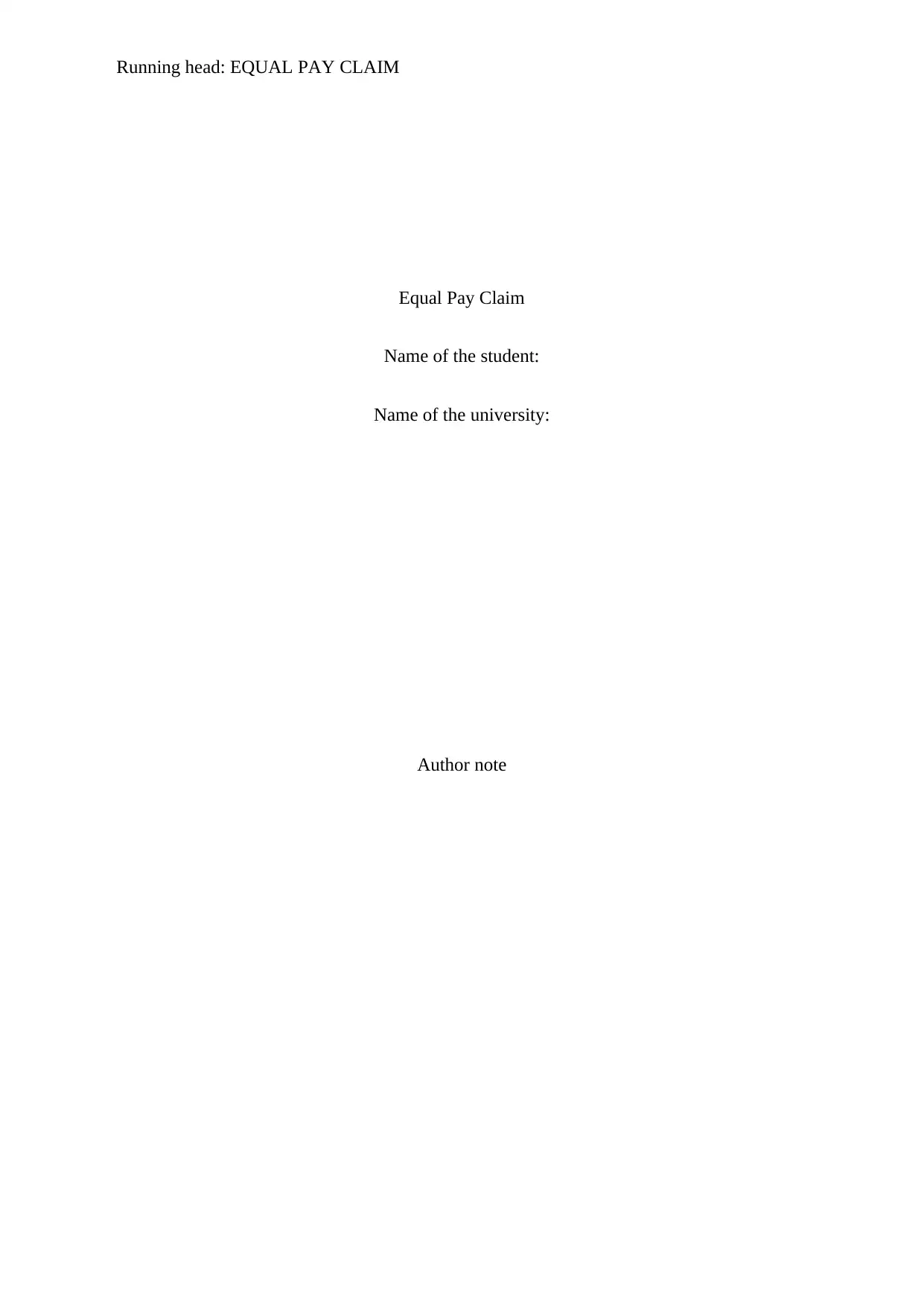
Running head: EQUAL PAY CLAIM
Equal Pay Claim
Name of the student:
Name of the university:
Author note
Equal Pay Claim
Name of the student:
Name of the university:
Author note
Paraphrase This Document
Need a fresh take? Get an instant paraphrase of this document with our AI Paraphraser
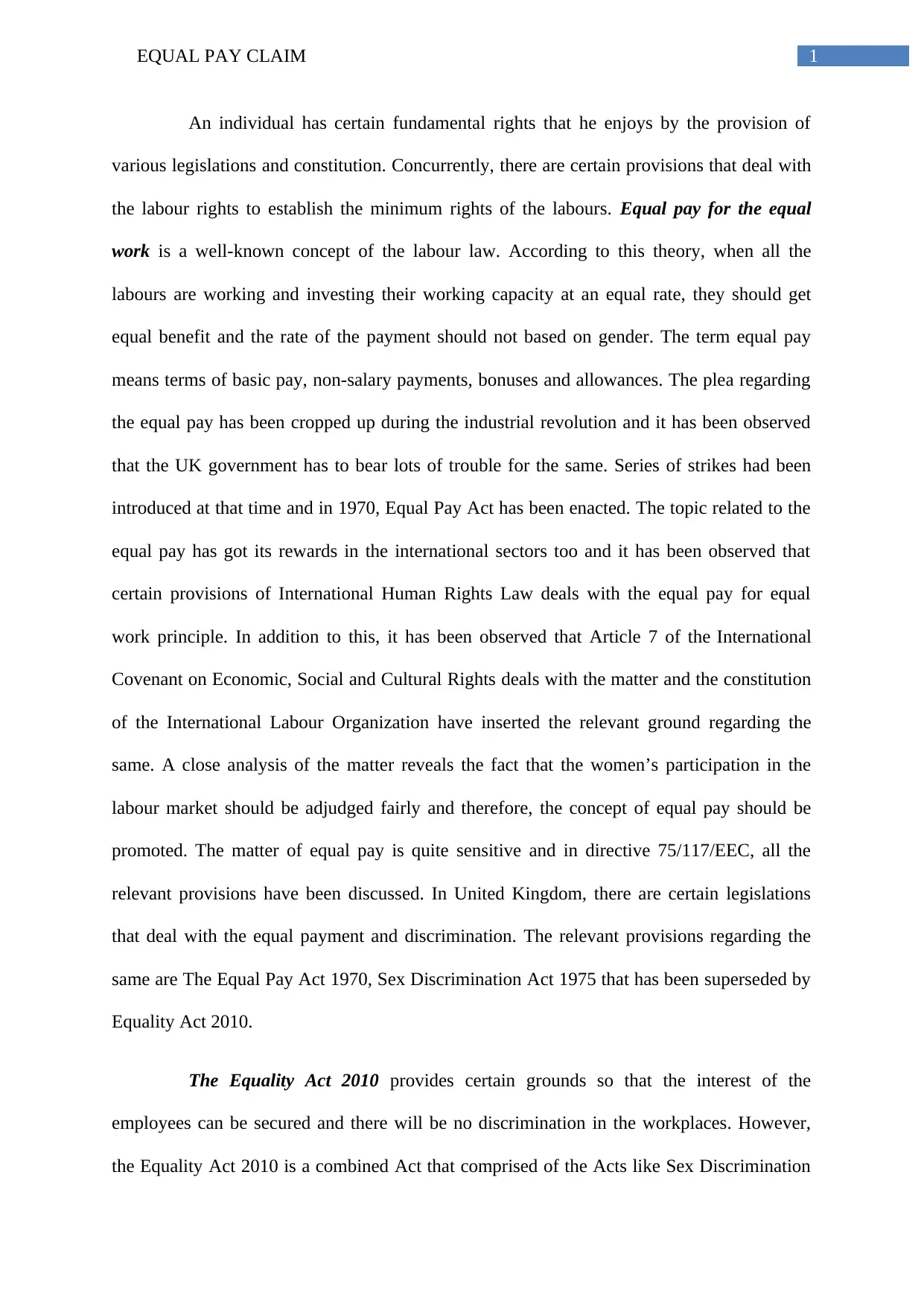
1EQUAL PAY CLAIM
An individual has certain fundamental rights that he enjoys by the provision of
various legislations and constitution. Concurrently, there are certain provisions that deal with
the labour rights to establish the minimum rights of the labours. Equal pay for the equal
work is a well-known concept of the labour law. According to this theory, when all the
labours are working and investing their working capacity at an equal rate, they should get
equal benefit and the rate of the payment should not based on gender. The term equal pay
means terms of basic pay, non-salary payments, bonuses and allowances. The plea regarding
the equal pay has been cropped up during the industrial revolution and it has been observed
that the UK government has to bear lots of trouble for the same. Series of strikes had been
introduced at that time and in 1970, Equal Pay Act has been enacted. The topic related to the
equal pay has got its rewards in the international sectors too and it has been observed that
certain provisions of International Human Rights Law deals with the equal pay for equal
work principle. In addition to this, it has been observed that Article 7 of the International
Covenant on Economic, Social and Cultural Rights deals with the matter and the constitution
of the International Labour Organization have inserted the relevant ground regarding the
same. A close analysis of the matter reveals the fact that the women’s participation in the
labour market should be adjudged fairly and therefore, the concept of equal pay should be
promoted. The matter of equal pay is quite sensitive and in directive 75/117/EEC, all the
relevant provisions have been discussed. In United Kingdom, there are certain legislations
that deal with the equal payment and discrimination. The relevant provisions regarding the
same are The Equal Pay Act 1970, Sex Discrimination Act 1975 that has been superseded by
Equality Act 2010.
The Equality Act 2010 provides certain grounds so that the interest of the
employees can be secured and there will be no discrimination in the workplaces. However,
the Equality Act 2010 is a combined Act that comprised of the Acts like Sex Discrimination
An individual has certain fundamental rights that he enjoys by the provision of
various legislations and constitution. Concurrently, there are certain provisions that deal with
the labour rights to establish the minimum rights of the labours. Equal pay for the equal
work is a well-known concept of the labour law. According to this theory, when all the
labours are working and investing their working capacity at an equal rate, they should get
equal benefit and the rate of the payment should not based on gender. The term equal pay
means terms of basic pay, non-salary payments, bonuses and allowances. The plea regarding
the equal pay has been cropped up during the industrial revolution and it has been observed
that the UK government has to bear lots of trouble for the same. Series of strikes had been
introduced at that time and in 1970, Equal Pay Act has been enacted. The topic related to the
equal pay has got its rewards in the international sectors too and it has been observed that
certain provisions of International Human Rights Law deals with the equal pay for equal
work principle. In addition to this, it has been observed that Article 7 of the International
Covenant on Economic, Social and Cultural Rights deals with the matter and the constitution
of the International Labour Organization have inserted the relevant ground regarding the
same. A close analysis of the matter reveals the fact that the women’s participation in the
labour market should be adjudged fairly and therefore, the concept of equal pay should be
promoted. The matter of equal pay is quite sensitive and in directive 75/117/EEC, all the
relevant provisions have been discussed. In United Kingdom, there are certain legislations
that deal with the equal payment and discrimination. The relevant provisions regarding the
same are The Equal Pay Act 1970, Sex Discrimination Act 1975 that has been superseded by
Equality Act 2010.
The Equality Act 2010 provides certain grounds so that the interest of the
employees can be secured and there will be no discrimination in the workplaces. However,
the Equality Act 2010 is a combined Act that comprised of the Acts like Sex Discrimination
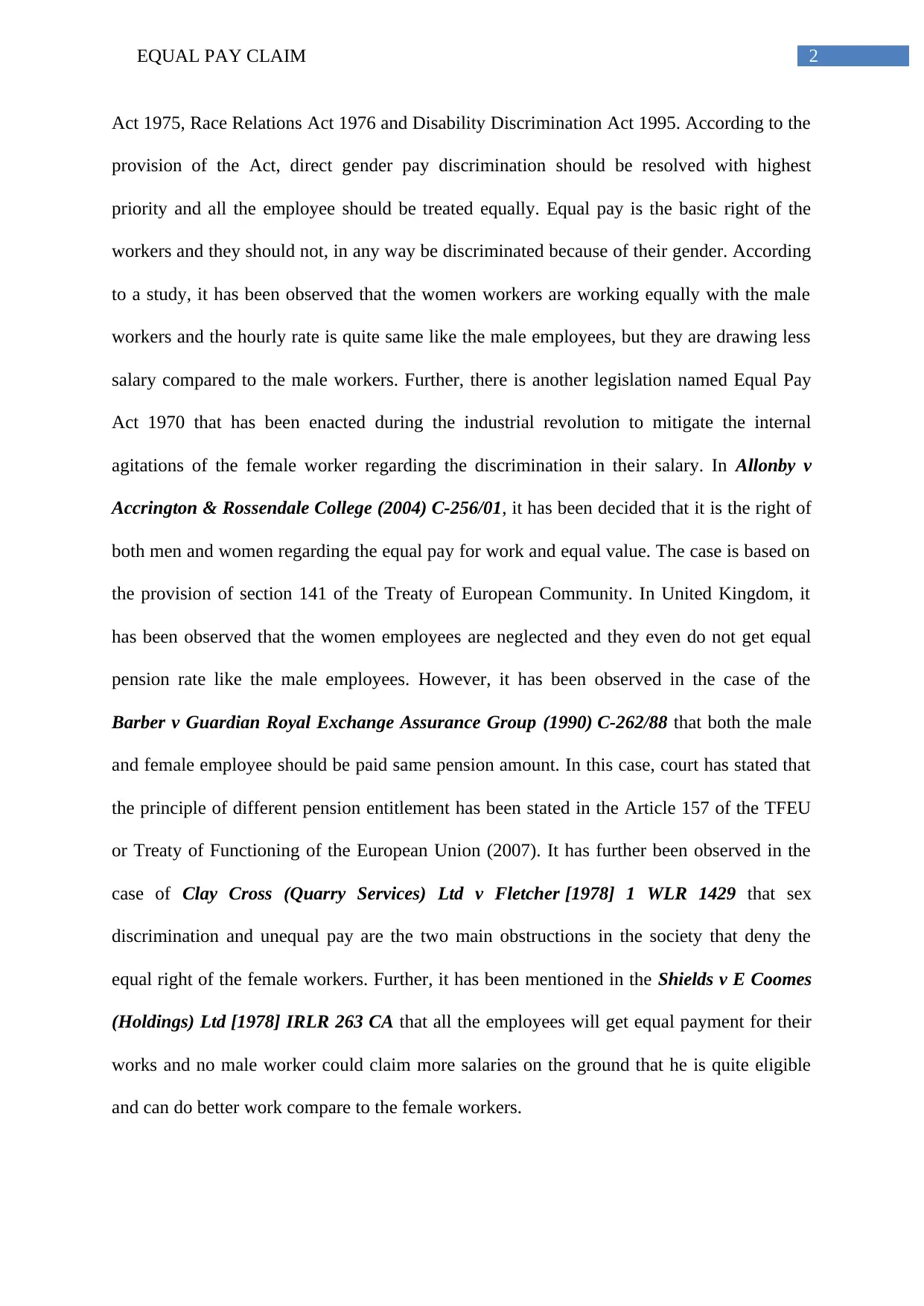
2EQUAL PAY CLAIM
Act 1975, Race Relations Act 1976 and Disability Discrimination Act 1995. According to the
provision of the Act, direct gender pay discrimination should be resolved with highest
priority and all the employee should be treated equally. Equal pay is the basic right of the
workers and they should not, in any way be discriminated because of their gender. According
to a study, it has been observed that the women workers are working equally with the male
workers and the hourly rate is quite same like the male employees, but they are drawing less
salary compared to the male workers. Further, there is another legislation named Equal Pay
Act 1970 that has been enacted during the industrial revolution to mitigate the internal
agitations of the female worker regarding the discrimination in their salary. In Allonby v
Accrington & Rossendale College (2004) C-256/01, it has been decided that it is the right of
both men and women regarding the equal pay for work and equal value. The case is based on
the provision of section 141 of the Treaty of European Community. In United Kingdom, it
has been observed that the women employees are neglected and they even do not get equal
pension rate like the male employees. However, it has been observed in the case of the
Barber v Guardian Royal Exchange Assurance Group (1990) C-262/88 that both the male
and female employee should be paid same pension amount. In this case, court has stated that
the principle of different pension entitlement has been stated in the Article 157 of the TFEU
or Treaty of Functioning of the European Union (2007). It has further been observed in the
case of Clay Cross (Quarry Services) Ltd v Fletcher [1978] 1 WLR 1429 that sex
discrimination and unequal pay are the two main obstructions in the society that deny the
equal right of the female workers. Further, it has been mentioned in the Shields v E Coomes
(Holdings) Ltd [1978] IRLR 263 CA that all the employees will get equal payment for their
works and no male worker could claim more salaries on the ground that he is quite eligible
and can do better work compare to the female workers.
Act 1975, Race Relations Act 1976 and Disability Discrimination Act 1995. According to the
provision of the Act, direct gender pay discrimination should be resolved with highest
priority and all the employee should be treated equally. Equal pay is the basic right of the
workers and they should not, in any way be discriminated because of their gender. According
to a study, it has been observed that the women workers are working equally with the male
workers and the hourly rate is quite same like the male employees, but they are drawing less
salary compared to the male workers. Further, there is another legislation named Equal Pay
Act 1970 that has been enacted during the industrial revolution to mitigate the internal
agitations of the female worker regarding the discrimination in their salary. In Allonby v
Accrington & Rossendale College (2004) C-256/01, it has been decided that it is the right of
both men and women regarding the equal pay for work and equal value. The case is based on
the provision of section 141 of the Treaty of European Community. In United Kingdom, it
has been observed that the women employees are neglected and they even do not get equal
pension rate like the male employees. However, it has been observed in the case of the
Barber v Guardian Royal Exchange Assurance Group (1990) C-262/88 that both the male
and female employee should be paid same pension amount. In this case, court has stated that
the principle of different pension entitlement has been stated in the Article 157 of the TFEU
or Treaty of Functioning of the European Union (2007). It has further been observed in the
case of Clay Cross (Quarry Services) Ltd v Fletcher [1978] 1 WLR 1429 that sex
discrimination and unequal pay are the two main obstructions in the society that deny the
equal right of the female workers. Further, it has been mentioned in the Shields v E Coomes
(Holdings) Ltd [1978] IRLR 263 CA that all the employees will get equal payment for their
works and no male worker could claim more salaries on the ground that he is quite eligible
and can do better work compare to the female workers.
⊘ This is a preview!⊘
Do you want full access?
Subscribe today to unlock all pages.

Trusted by 1+ million students worldwide
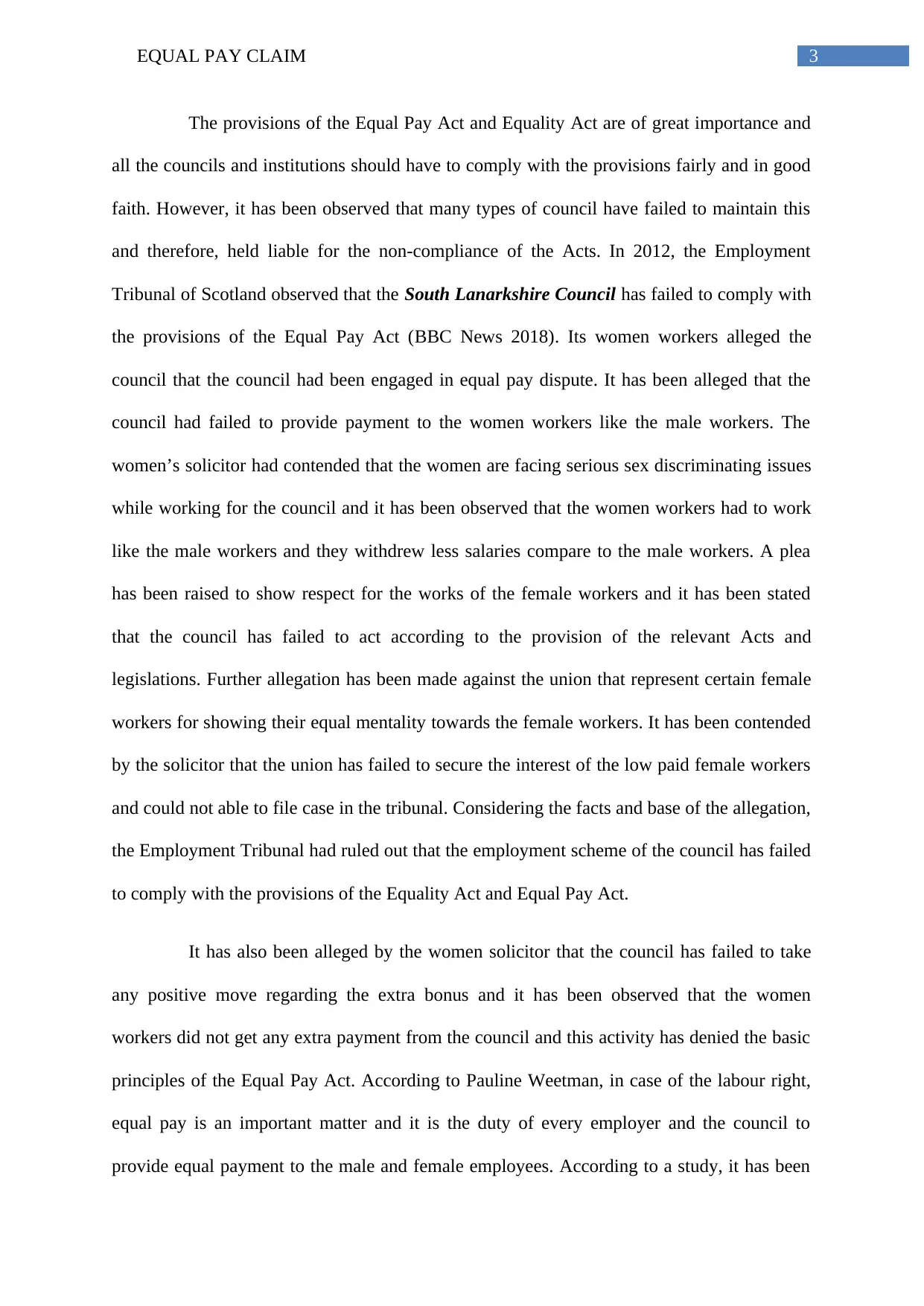
3EQUAL PAY CLAIM
The provisions of the Equal Pay Act and Equality Act are of great importance and
all the councils and institutions should have to comply with the provisions fairly and in good
faith. However, it has been observed that many types of council have failed to maintain this
and therefore, held liable for the non-compliance of the Acts. In 2012, the Employment
Tribunal of Scotland observed that the South Lanarkshire Council has failed to comply with
the provisions of the Equal Pay Act (BBC News 2018). Its women workers alleged the
council that the council had been engaged in equal pay dispute. It has been alleged that the
council had failed to provide payment to the women workers like the male workers. The
women’s solicitor had contended that the women are facing serious sex discriminating issues
while working for the council and it has been observed that the women workers had to work
like the male workers and they withdrew less salaries compare to the male workers. A plea
has been raised to show respect for the works of the female workers and it has been stated
that the council has failed to act according to the provision of the relevant Acts and
legislations. Further allegation has been made against the union that represent certain female
workers for showing their equal mentality towards the female workers. It has been contended
by the solicitor that the union has failed to secure the interest of the low paid female workers
and could not able to file case in the tribunal. Considering the facts and base of the allegation,
the Employment Tribunal had ruled out that the employment scheme of the council has failed
to comply with the provisions of the Equality Act and Equal Pay Act.
It has also been alleged by the women solicitor that the council has failed to take
any positive move regarding the extra bonus and it has been observed that the women
workers did not get any extra payment from the council and this activity has denied the basic
principles of the Equal Pay Act. According to Pauline Weetman, in case of the labour right,
equal pay is an important matter and it is the duty of every employer and the council to
provide equal payment to the male and female employees. According to a study, it has been
The provisions of the Equal Pay Act and Equality Act are of great importance and
all the councils and institutions should have to comply with the provisions fairly and in good
faith. However, it has been observed that many types of council have failed to maintain this
and therefore, held liable for the non-compliance of the Acts. In 2012, the Employment
Tribunal of Scotland observed that the South Lanarkshire Council has failed to comply with
the provisions of the Equal Pay Act (BBC News 2018). Its women workers alleged the
council that the council had been engaged in equal pay dispute. It has been alleged that the
council had failed to provide payment to the women workers like the male workers. The
women’s solicitor had contended that the women are facing serious sex discriminating issues
while working for the council and it has been observed that the women workers had to work
like the male workers and they withdrew less salaries compare to the male workers. A plea
has been raised to show respect for the works of the female workers and it has been stated
that the council has failed to act according to the provision of the relevant Acts and
legislations. Further allegation has been made against the union that represent certain female
workers for showing their equal mentality towards the female workers. It has been contended
by the solicitor that the union has failed to secure the interest of the low paid female workers
and could not able to file case in the tribunal. Considering the facts and base of the allegation,
the Employment Tribunal had ruled out that the employment scheme of the council has failed
to comply with the provisions of the Equality Act and Equal Pay Act.
It has also been alleged by the women solicitor that the council has failed to take
any positive move regarding the extra bonus and it has been observed that the women
workers did not get any extra payment from the council and this activity has denied the basic
principles of the Equal Pay Act. According to Pauline Weetman, in case of the labour right,
equal pay is an important matter and it is the duty of every employer and the council to
provide equal payment to the male and female employees. According to a study, it has been
Paraphrase This Document
Need a fresh take? Get an instant paraphrase of this document with our AI Paraphraser
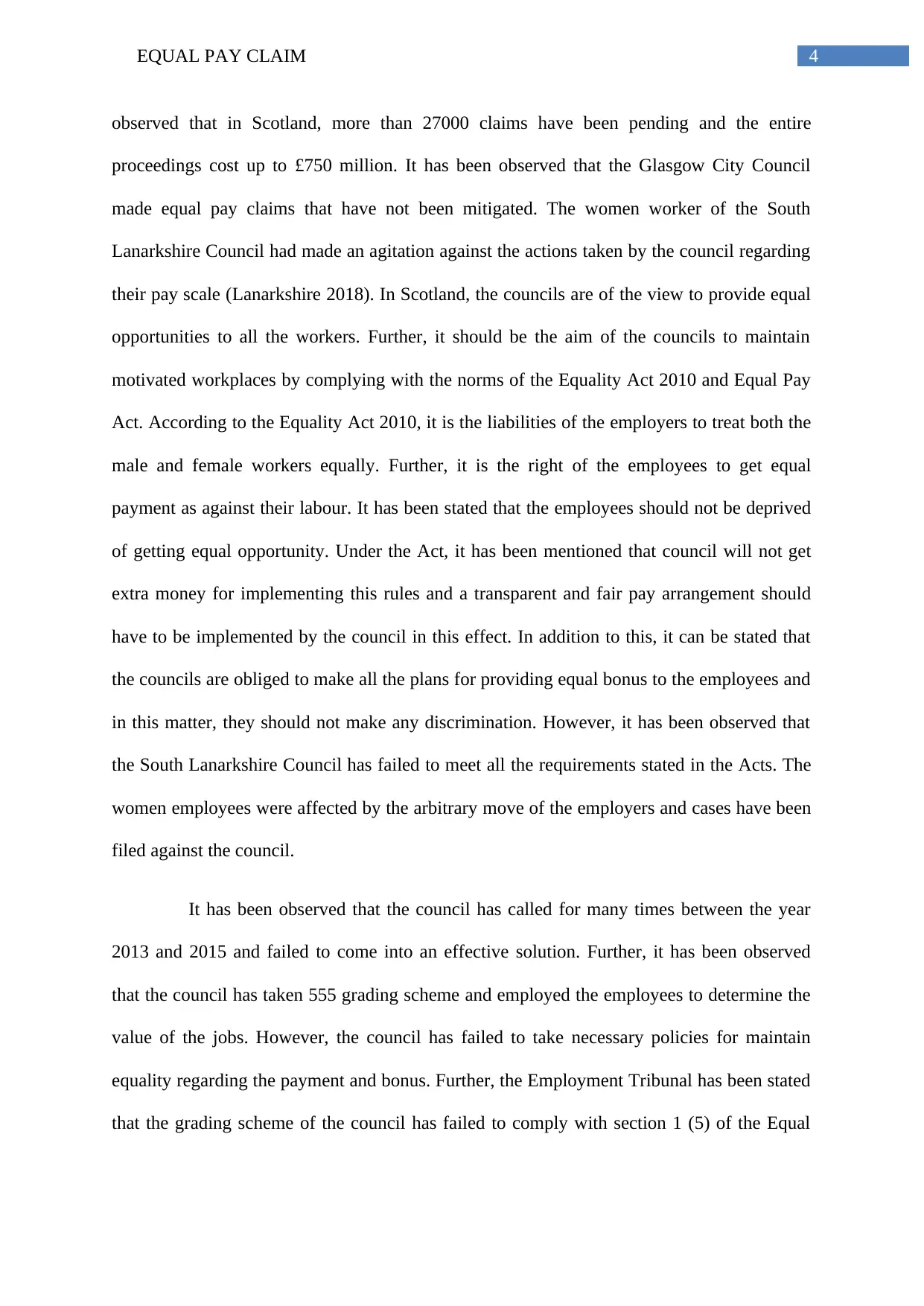
4EQUAL PAY CLAIM
observed that in Scotland, more than 27000 claims have been pending and the entire
proceedings cost up to £750 million. It has been observed that the Glasgow City Council
made equal pay claims that have not been mitigated. The women worker of the South
Lanarkshire Council had made an agitation against the actions taken by the council regarding
their pay scale (Lanarkshire 2018). In Scotland, the councils are of the view to provide equal
opportunities to all the workers. Further, it should be the aim of the councils to maintain
motivated workplaces by complying with the norms of the Equality Act 2010 and Equal Pay
Act. According to the Equality Act 2010, it is the liabilities of the employers to treat both the
male and female workers equally. Further, it is the right of the employees to get equal
payment as against their labour. It has been stated that the employees should not be deprived
of getting equal opportunity. Under the Act, it has been mentioned that council will not get
extra money for implementing this rules and a transparent and fair pay arrangement should
have to be implemented by the council in this effect. In addition to this, it can be stated that
the councils are obliged to make all the plans for providing equal bonus to the employees and
in this matter, they should not make any discrimination. However, it has been observed that
the South Lanarkshire Council has failed to meet all the requirements stated in the Acts. The
women employees were affected by the arbitrary move of the employers and cases have been
filed against the council.
It has been observed that the council has called for many times between the year
2013 and 2015 and failed to come into an effective solution. Further, it has been observed
that the council has taken 555 grading scheme and employed the employees to determine the
value of the jobs. However, the council has failed to take necessary policies for maintain
equality regarding the payment and bonus. Further, the Employment Tribunal has been stated
that the grading scheme of the council has failed to comply with section 1 (5) of the Equal
observed that in Scotland, more than 27000 claims have been pending and the entire
proceedings cost up to £750 million. It has been observed that the Glasgow City Council
made equal pay claims that have not been mitigated. The women worker of the South
Lanarkshire Council had made an agitation against the actions taken by the council regarding
their pay scale (Lanarkshire 2018). In Scotland, the councils are of the view to provide equal
opportunities to all the workers. Further, it should be the aim of the councils to maintain
motivated workplaces by complying with the norms of the Equality Act 2010 and Equal Pay
Act. According to the Equality Act 2010, it is the liabilities of the employers to treat both the
male and female workers equally. Further, it is the right of the employees to get equal
payment as against their labour. It has been stated that the employees should not be deprived
of getting equal opportunity. Under the Act, it has been mentioned that council will not get
extra money for implementing this rules and a transparent and fair pay arrangement should
have to be implemented by the council in this effect. In addition to this, it can be stated that
the councils are obliged to make all the plans for providing equal bonus to the employees and
in this matter, they should not make any discrimination. However, it has been observed that
the South Lanarkshire Council has failed to meet all the requirements stated in the Acts. The
women employees were affected by the arbitrary move of the employers and cases have been
filed against the council.
It has been observed that the council has called for many times between the year
2013 and 2015 and failed to come into an effective solution. Further, it has been observed
that the council has taken 555 grading scheme and employed the employees to determine the
value of the jobs. However, the council has failed to take necessary policies for maintain
equality regarding the payment and bonus. Further, the Employment Tribunal has been stated
that the grading scheme of the council has failed to comply with section 1 (5) of the Equal

5EQUAL PAY CLAIM
Pay Act 1970. All these things made the council amend their employment provision and the
council has to pay compensation for the same.
Pay Act 1970. All these things made the council amend their employment provision and the
council has to pay compensation for the same.
⊘ This is a preview!⊘
Do you want full access?
Subscribe today to unlock all pages.

Trusted by 1+ million students worldwide
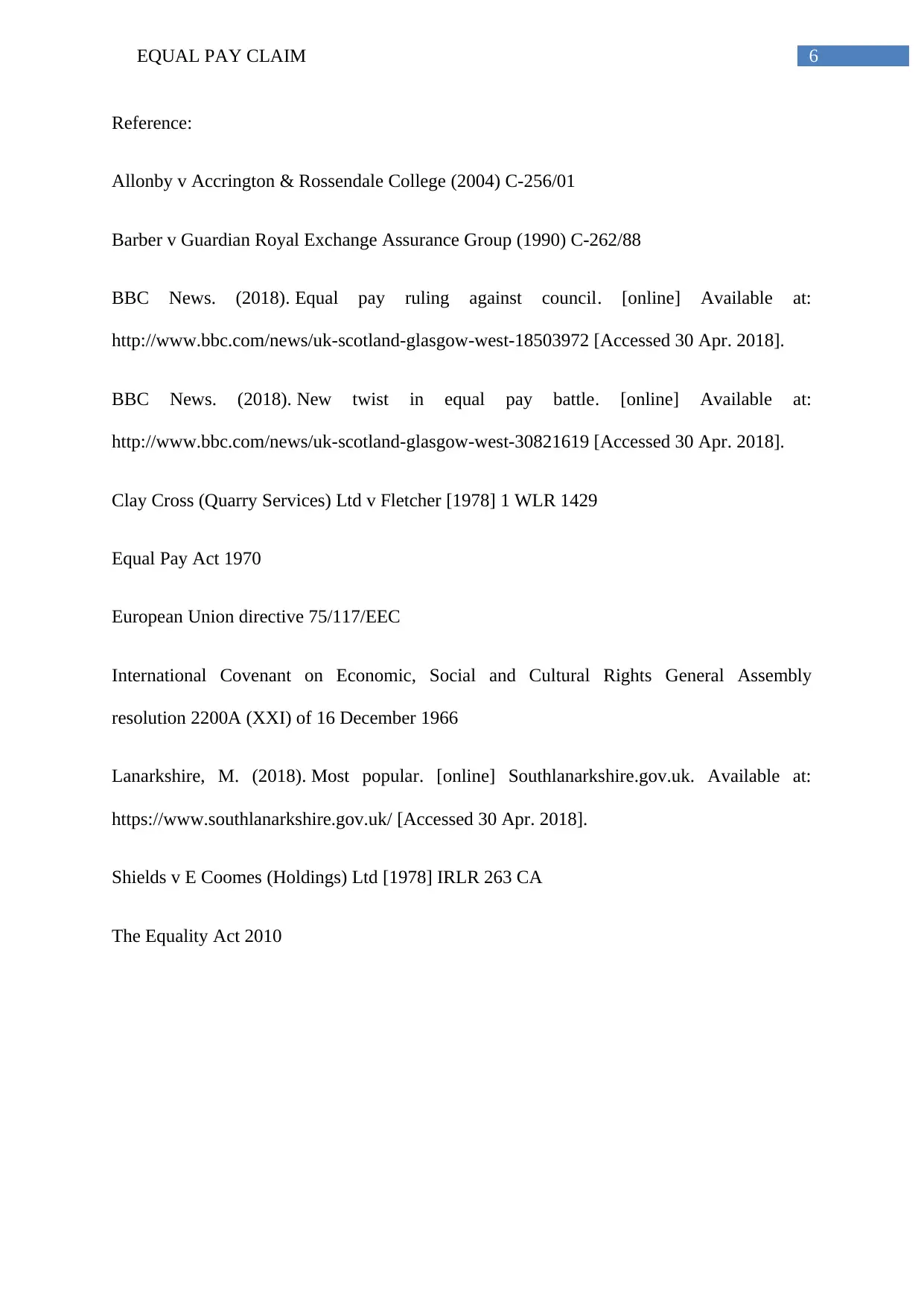
6EQUAL PAY CLAIM
Reference:
Allonby v Accrington & Rossendale College (2004) C-256/01
Barber v Guardian Royal Exchange Assurance Group (1990) C-262/88
BBC News. (2018). Equal pay ruling against council. [online] Available at:
http://www.bbc.com/news/uk-scotland-glasgow-west-18503972 [Accessed 30 Apr. 2018].
BBC News. (2018). New twist in equal pay battle. [online] Available at:
http://www.bbc.com/news/uk-scotland-glasgow-west-30821619 [Accessed 30 Apr. 2018].
Clay Cross (Quarry Services) Ltd v Fletcher [1978] 1 WLR 1429
Equal Pay Act 1970
European Union directive 75/117/EEC
International Covenant on Economic, Social and Cultural Rights General Assembly
resolution 2200A (XXI) of 16 December 1966
Lanarkshire, M. (2018). Most popular. [online] Southlanarkshire.gov.uk. Available at:
https://www.southlanarkshire.gov.uk/ [Accessed 30 Apr. 2018].
Shields v E Coomes (Holdings) Ltd [1978] IRLR 263 CA
The Equality Act 2010
Reference:
Allonby v Accrington & Rossendale College (2004) C-256/01
Barber v Guardian Royal Exchange Assurance Group (1990) C-262/88
BBC News. (2018). Equal pay ruling against council. [online] Available at:
http://www.bbc.com/news/uk-scotland-glasgow-west-18503972 [Accessed 30 Apr. 2018].
BBC News. (2018). New twist in equal pay battle. [online] Available at:
http://www.bbc.com/news/uk-scotland-glasgow-west-30821619 [Accessed 30 Apr. 2018].
Clay Cross (Quarry Services) Ltd v Fletcher [1978] 1 WLR 1429
Equal Pay Act 1970
European Union directive 75/117/EEC
International Covenant on Economic, Social and Cultural Rights General Assembly
resolution 2200A (XXI) of 16 December 1966
Lanarkshire, M. (2018). Most popular. [online] Southlanarkshire.gov.uk. Available at:
https://www.southlanarkshire.gov.uk/ [Accessed 30 Apr. 2018].
Shields v E Coomes (Holdings) Ltd [1978] IRLR 263 CA
The Equality Act 2010
1 out of 7
Related Documents
Your All-in-One AI-Powered Toolkit for Academic Success.
+13062052269
info@desklib.com
Available 24*7 on WhatsApp / Email
![[object Object]](/_next/static/media/star-bottom.7253800d.svg)
Unlock your academic potential
Copyright © 2020–2026 A2Z Services. All Rights Reserved. Developed and managed by ZUCOL.





